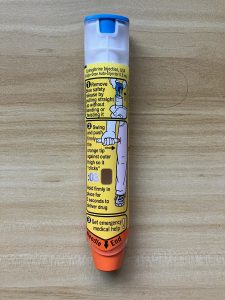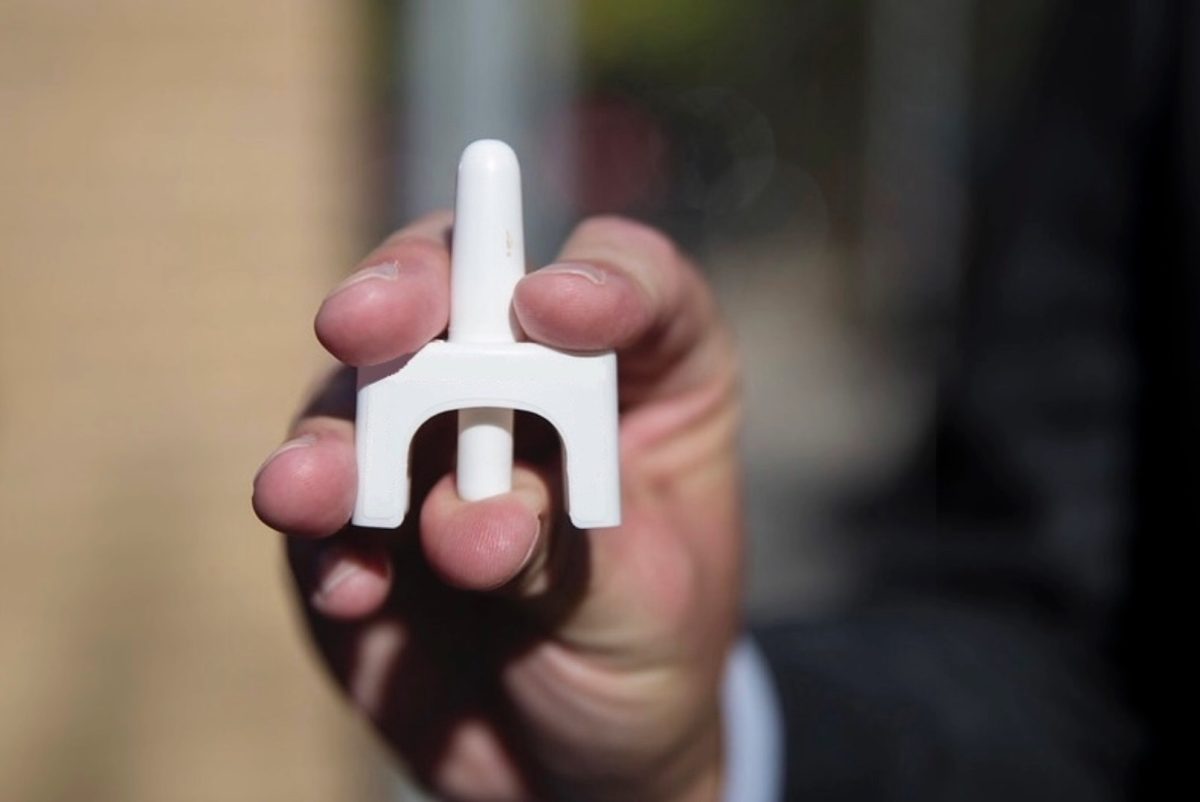On a family trip to Germany several years ago, a seemingly innocuous breakfast at an airport cafe quickly turned into a nightmare for MVHS parent Uma Krishnamoorthy. Over the course of just 30 minutes, she watched as her daughter Anya Wojciechowski’s stomach ache developed into repeated vomiting and hives breaking out all over her body. When Krishnamoorthy took her daughter to the airport medical facility, doctors treated her for anaphylaxis, a severe allergic reaction in which the body goes into shock, causing difficulty breathing and dangerously low blood pressure along with rashes or vomiting.
Typically, anaphylaxis is treated with an adrenaline kit, most commonly an EpiPen. However, this August, the FDA approved a new drug, neffy, for rollout in the coming months, meaning that it will gradually be distributed to pharmacies and available to doctors who want to prescribe it. As per the clinical trials so far, neffy is just as effective at treating anaphylaxis as an EpiPen, but in the form of a nasal spray. Though the EpiPen Jr. remains the only option for young children, neffy is now approved for anyone weighing over 66 pounds and covered by most insurance companies for an out-of-pocket cost of just $25. Some of its key advantages over the EpiPen include a more stable shelf life and no needle, making it easier for most people to administer.
Dr. James Wolfe, a Stanford Clinical Professor of Medicine and immunologist, says that while some patients have no problems with needles, even self-administering, he has noticed that fear of needles is common in patients of all ages.
“Everybody seems to say they’re on board and they listen, but when push comes to shove, there’s fear of using the product,” Wolfe said. “So often the injection is given to the patient when it’s too late, and the reaction can become much more severe and more life threatening.”
In fact, the most common cause of death from food allergies isn’t missing the reaction or not having an EpiPen available but using the EpiPen too late. On top of this, improper use of antihistamines (the same medication in inhalers used for mild pollen allergies) can mask the serious symptoms of anaphylaxis, making it all the more crucial for people to not hesitate to use EpiPens or other adrenaline treatments.
While sophomore Jake Tong, who has lived with nut allergies ever since he was a young child, agrees that needles may be a problem for some, he says this has not been his experience. Rather, he recalls that during previous allergic reactions, he hardly thought about the EpiPen needle even while his dad was administering it.
“Using the EpiPen is fine, because the allergic reaction is more painful than actually stabbing the pen into your leg,” Tong said. “You don’t really feel the pen anyway. But nasal spray might be better for people who are afraid of sharp things.”

Tong also notes that the instructions on the side of an EpiPen have always been enough for him and his family to use it correctly when necessary, making the format of a nasal spray only a small advantage. However, Krishnamoorthy sees these instructions as more of a reference and not enough for someone who hasn’t used an EpiPen in a long time or ever. She believes that being a nasal spray makes neffy significantly easier to administer, both for people familiar with allergies and members of the public.
“Trying to essentially shove a sharp pin down somebody’s leg requires a little bit of knowledge of what you’re doing,” Krishnamoorthy said. “Some you have to pop certain things open to engage the needle, and there are some variables — where you stab it and how long you hold it. With a nasal spray, you can self administer pretty easily, and somebody else can administer it easily.”
Another one of neffy’s reported advantages is its comparatively low heat sensitivity. While an EpiPen can only withstand short intervals of heat up to 122°F, neffy is stable for longer periods of time at the same heat. And while even a short duration of freezing reduces the potency of an EpiPen, in many cases, neffy can be unfrozen and used.
Wolfe explains that this is because with an EpiPen, as with most drugs, even accidental exposure to high heat such as leaving it in a car on a hot day can chemically break down the active ingredients, making it less potent. With neffy, consumers won’t have to worry as much about unexpected failure of the drug, and it will be easier for medical organizations to store and transport it, expanding access to more communities in need.
Though Krishnamoorthy and Tong both see potential benefits with neffy, they express hesitation with using it due to its fairly recent introduction into the market. Tong says his main consideration is potential undiscovered side effects, especially since he’s already used to Benadryl and EpiPens to manage his allergies. Krishnamoorthy agrees, expressing concern about how stringent FDA approvals are and wariness particularly when it comes to her children’s health. She emphasizes her struggle to let go of the fear of allergic reactions that she has had ever since her older daughter’s diagnosis.
“It was pretty traumatic, frankly,” Krishnamoorthy said. “The idea of navigating — not just for her as a child, but also as an adult in society — was nerve wracking to think about. But I don’t want to limit our life because of it.”
Krishnamoorthy remains optimistic that in the coming years, as neffy becomes more established, it will become a viable alternative to EpiPens for her family. Wolfe agrees, saying that unless significant additional data comes out, neffy is poised to replace the EpiPen in most cases.
“I don’t think adrenaline kit companies recognize how much of an appetite there is on the part of parents and patients to not have to use a shot,” Wolfe said. “This is going to be a blockbuster drug.”











